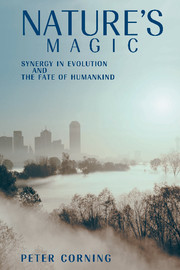Book contents
- Frontmatter
- Contents
- 1 Prologue: The New Evolutionary Paradigm
- 2 The “Enchanted Loom”
- 3 The Magic Castle
- 4 “Black Magic”
- 5 The Synergism Hypothesis
- 6 “The Sorcerer's Apprentice”
- 7 Conjuring Human Evolution: The Synergistic Ape
- 8 Conjuring History: Does Cultural Evolution Have an “Arrow”?
- 9 The Science of History
- 10 Conjuring the Future: What Can We Predict?
- Afterword
- Notes
- References
- Index
10 - Conjuring the Future: What Can We Predict?
Published online by Cambridge University Press: 22 August 2009
- Frontmatter
- Contents
- 1 Prologue: The New Evolutionary Paradigm
- 2 The “Enchanted Loom”
- 3 The Magic Castle
- 4 “Black Magic”
- 5 The Synergism Hypothesis
- 6 “The Sorcerer's Apprentice”
- 7 Conjuring Human Evolution: The Synergistic Ape
- 8 Conjuring History: Does Cultural Evolution Have an “Arrow”?
- 9 The Science of History
- 10 Conjuring the Future: What Can We Predict?
- Afterword
- Notes
- References
- Index
Summary
Though history doesn't repeat itself, it does to rhyme.
Mark TwainPlans are useless, but planning is indispensable.
Dwight D. EisenhowerThe ancient dream of being able to predict the future of the human career has retained its seductive allure over the years. For example, the well-known twentieth-century anthropologist Raoul Naroll documented the historical trend toward ever-larger aggregates and concluded that the probabilities for achieving a world state ranged from the year 2125 (a 40% probability) to 2750 (a 95% probability). Robert Carneiro came to a similar conclusion but used a different methodology. He projected forward the historical trend toward a decreasing number of independent political units and declared that, provided nuclear annihilation can be avoided, “a world state cannot be far off.” It's a matter of centuries or even decades, not millennia, he declared.
Sociobiologist Edward O. Wilson, in a 1970s book coauthored by Charles Lumsden (Genes, Mind and Culture), also joined the futurist parade with what he characterized as an “autocatalytic” theory of cultural evolution.
The ultimate triumph of both human sociobiology and the traditional social sciences would be to correctly explain and predict trends in cultural evolution on the basis of their own axioms … Will the social sciences, using all of the considerable resources at their disposal and designing ever more comprehensive multifactorial models, be able to explain history more fully and perhaps even predict with moderate accuracy? We believe the answer is yes, at least on a limited scale. … The prediction of history is a worthwhile venture.
- Type
- Chapter
- Information
- Nature's MagicSynergy in Evolution and the Fate of Humankind, pp. 300 - 319Publisher: Cambridge University PressPrint publication year: 2003



